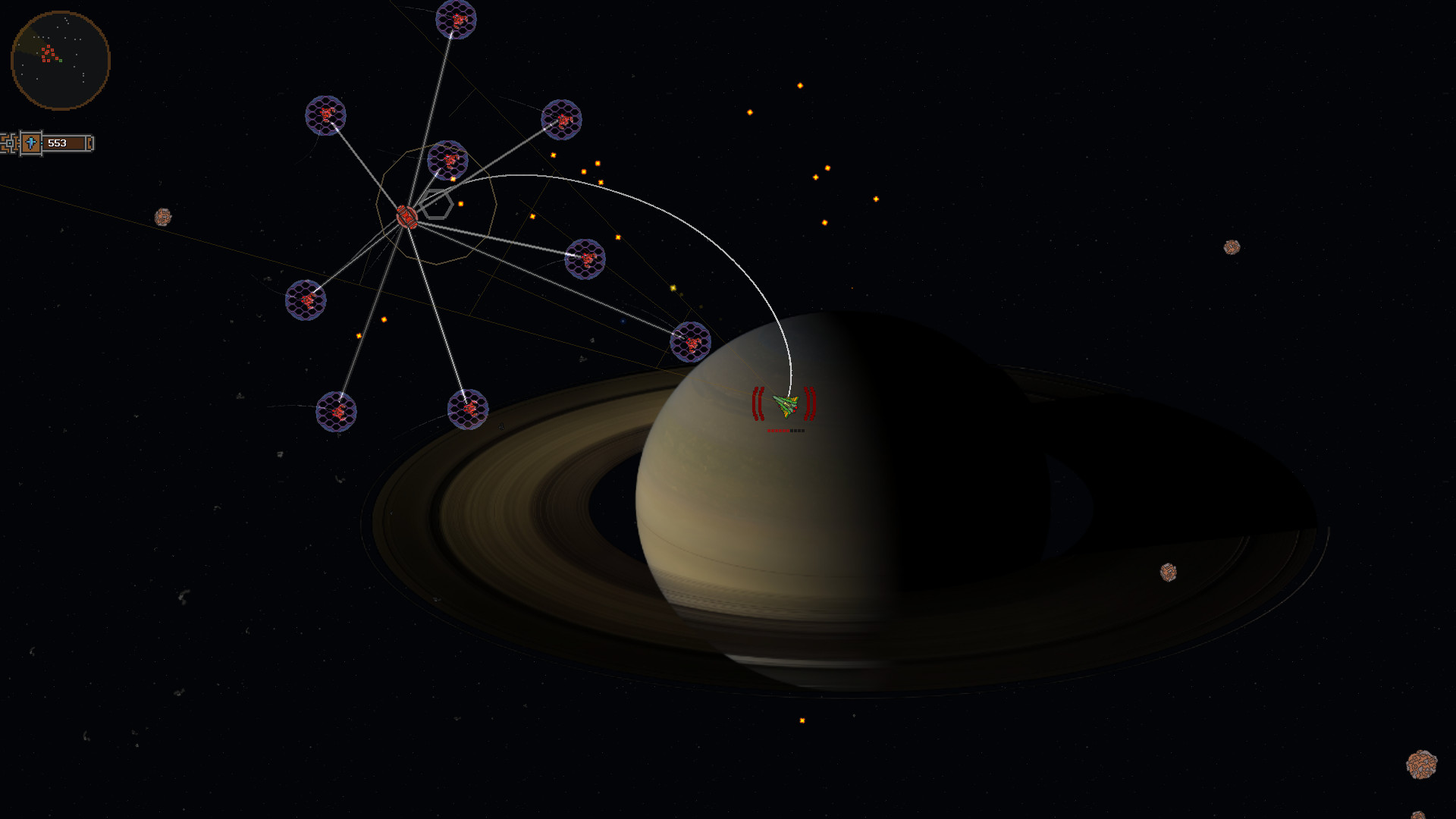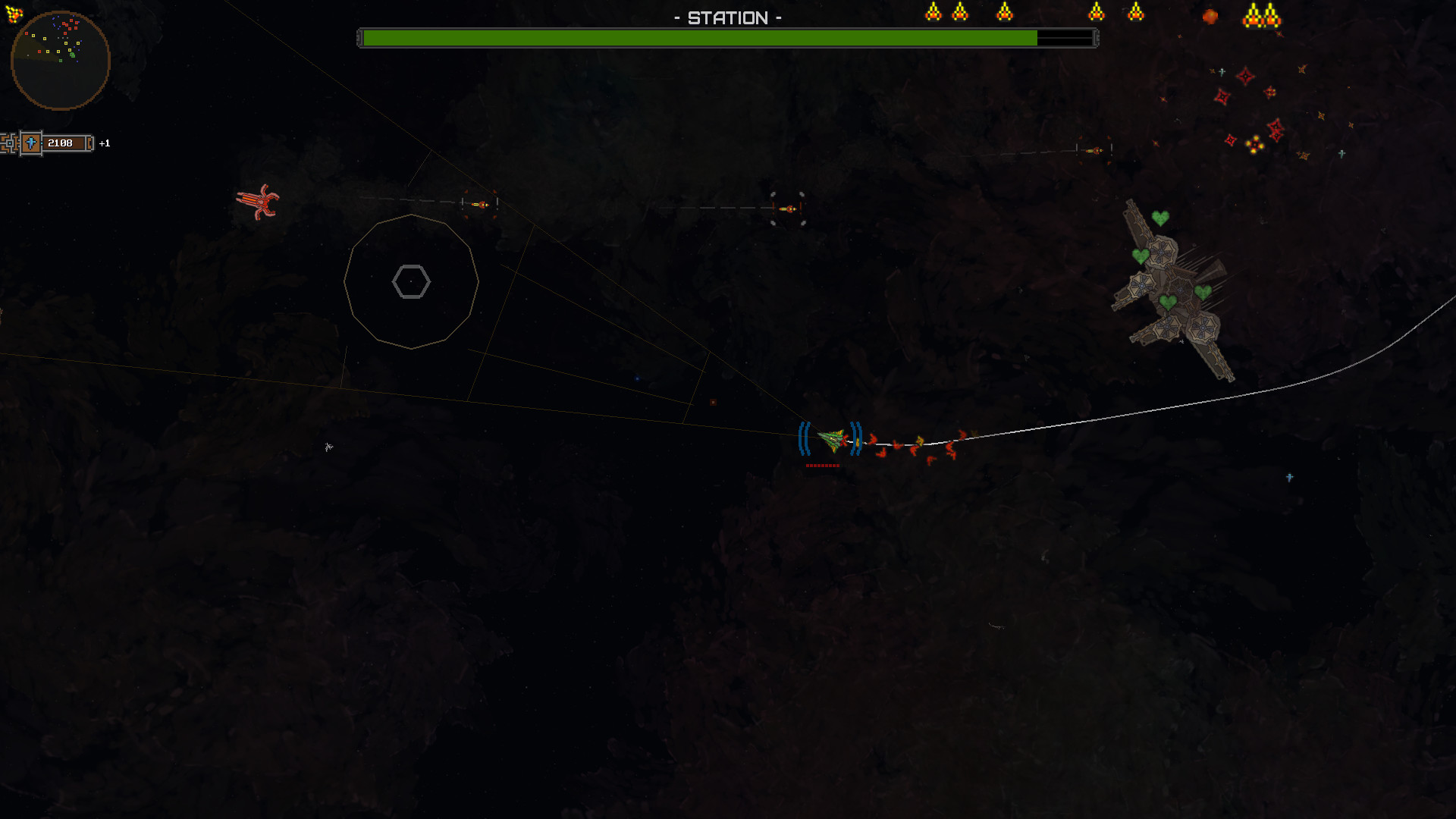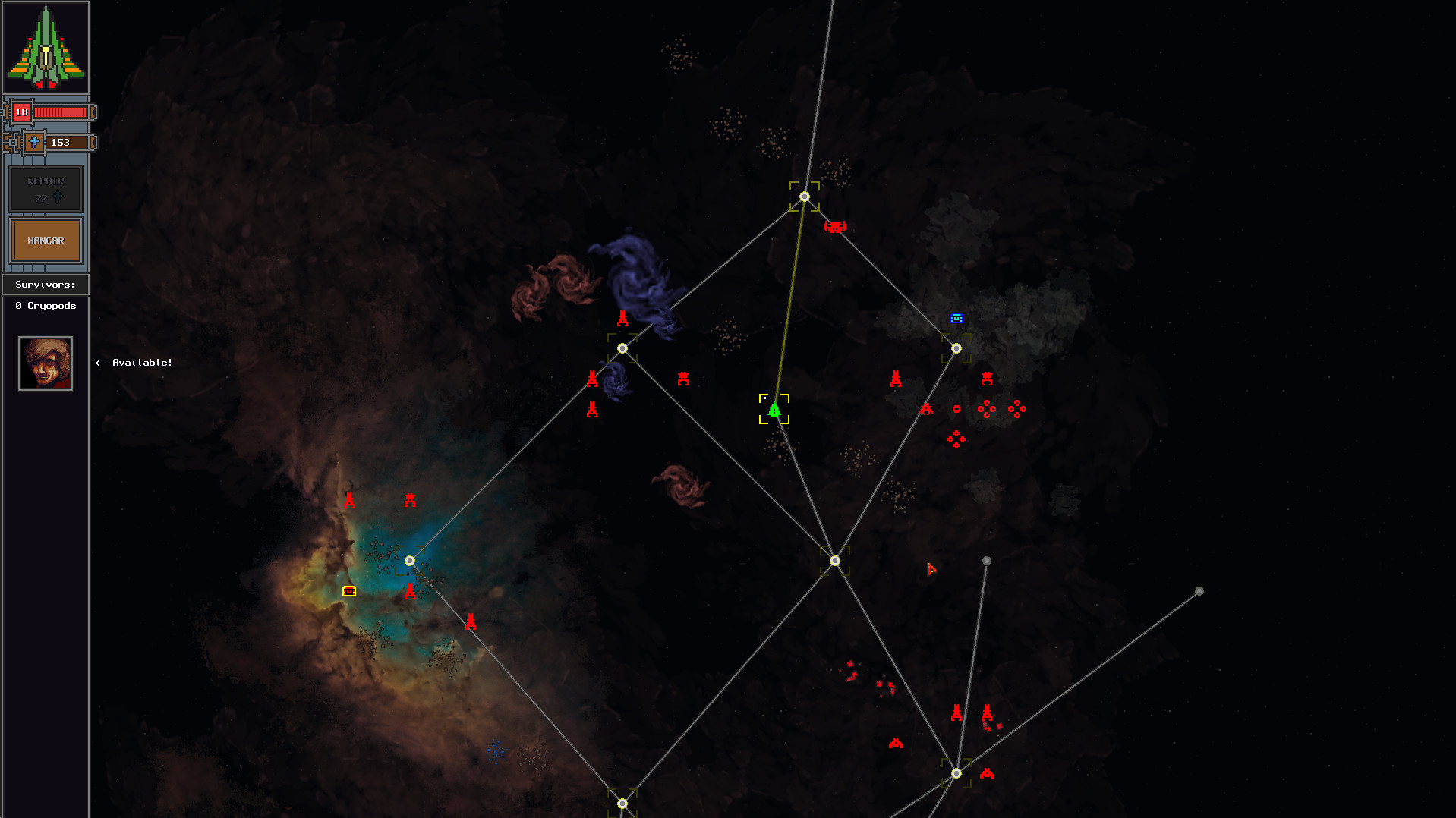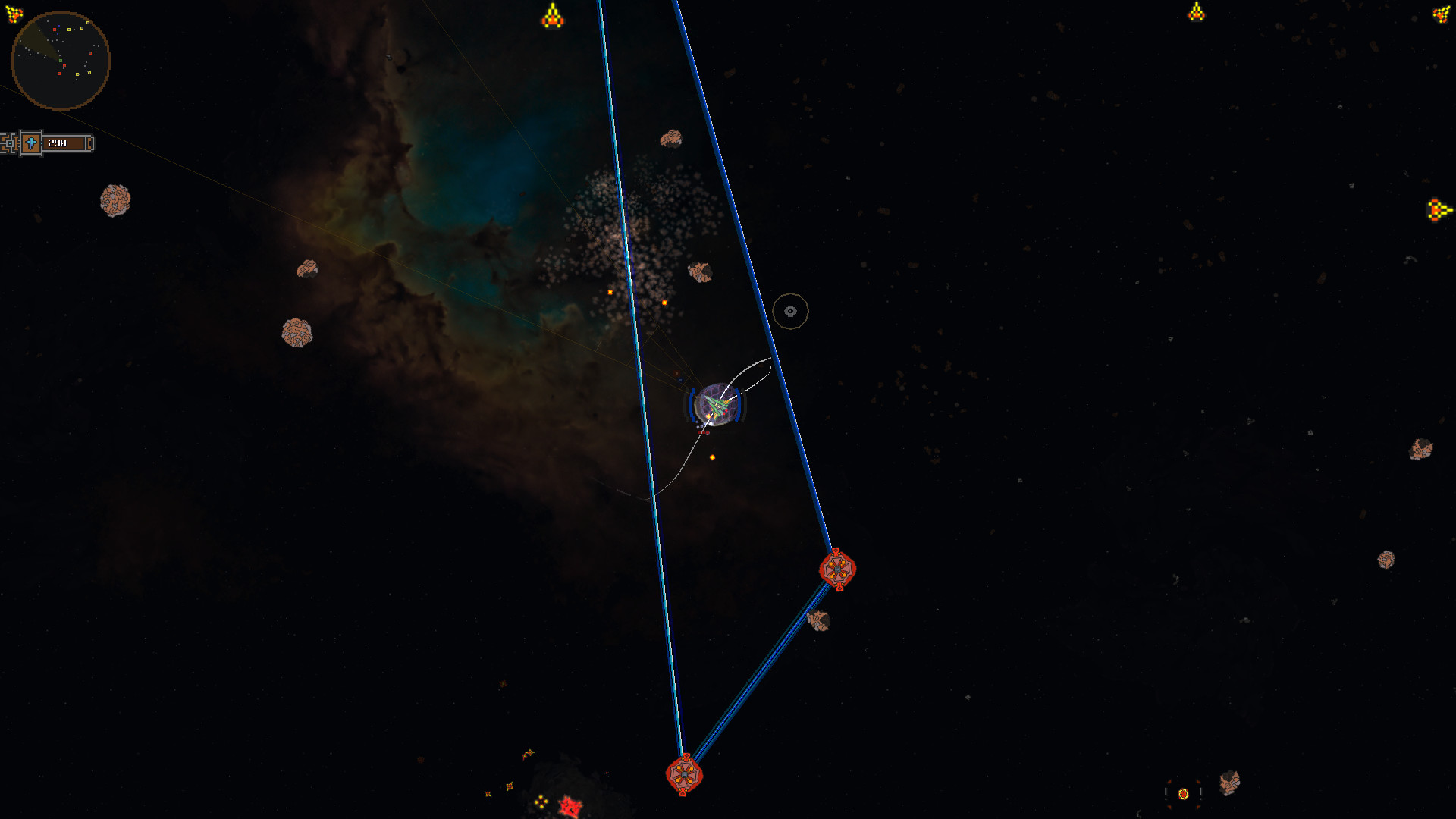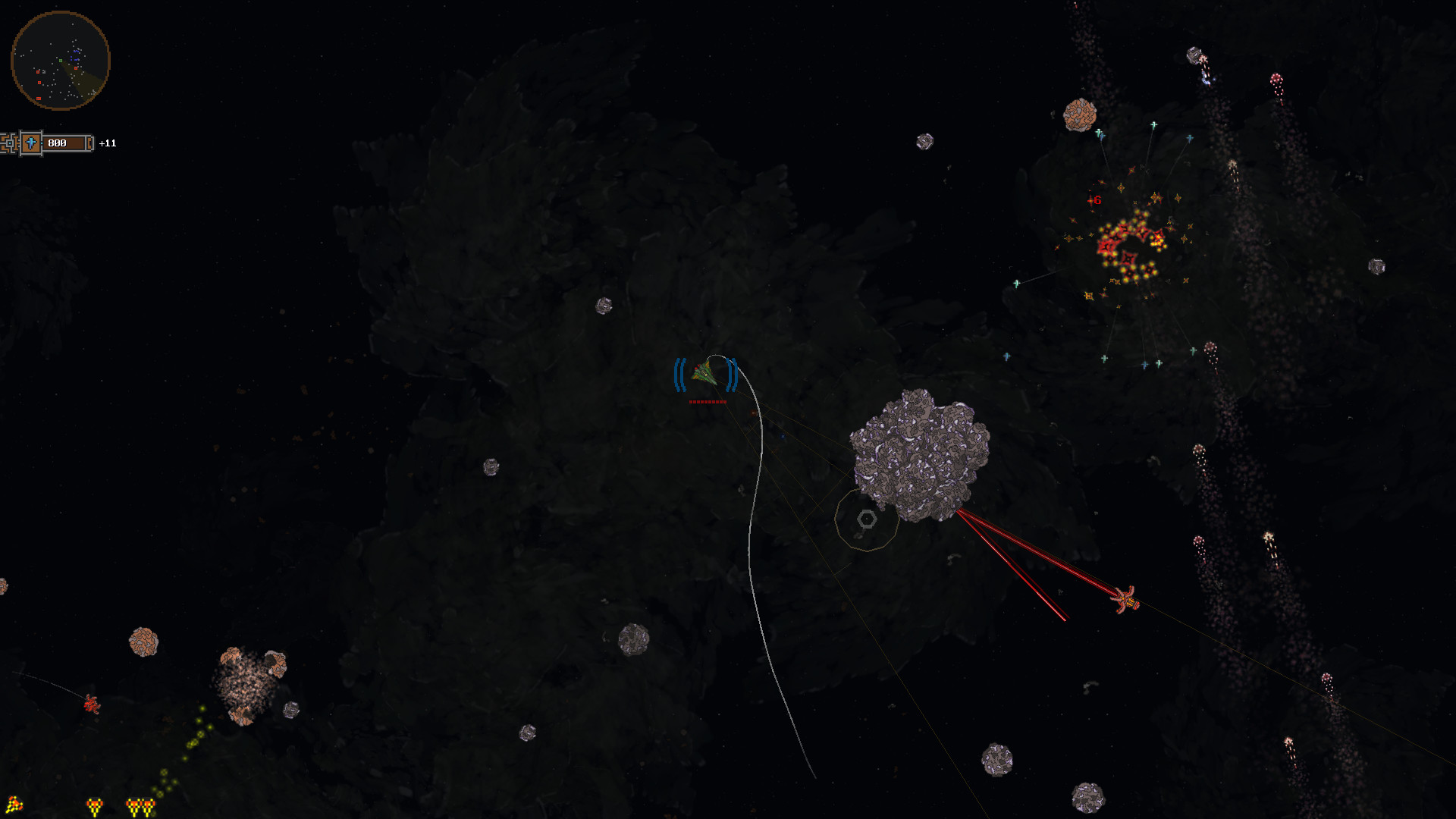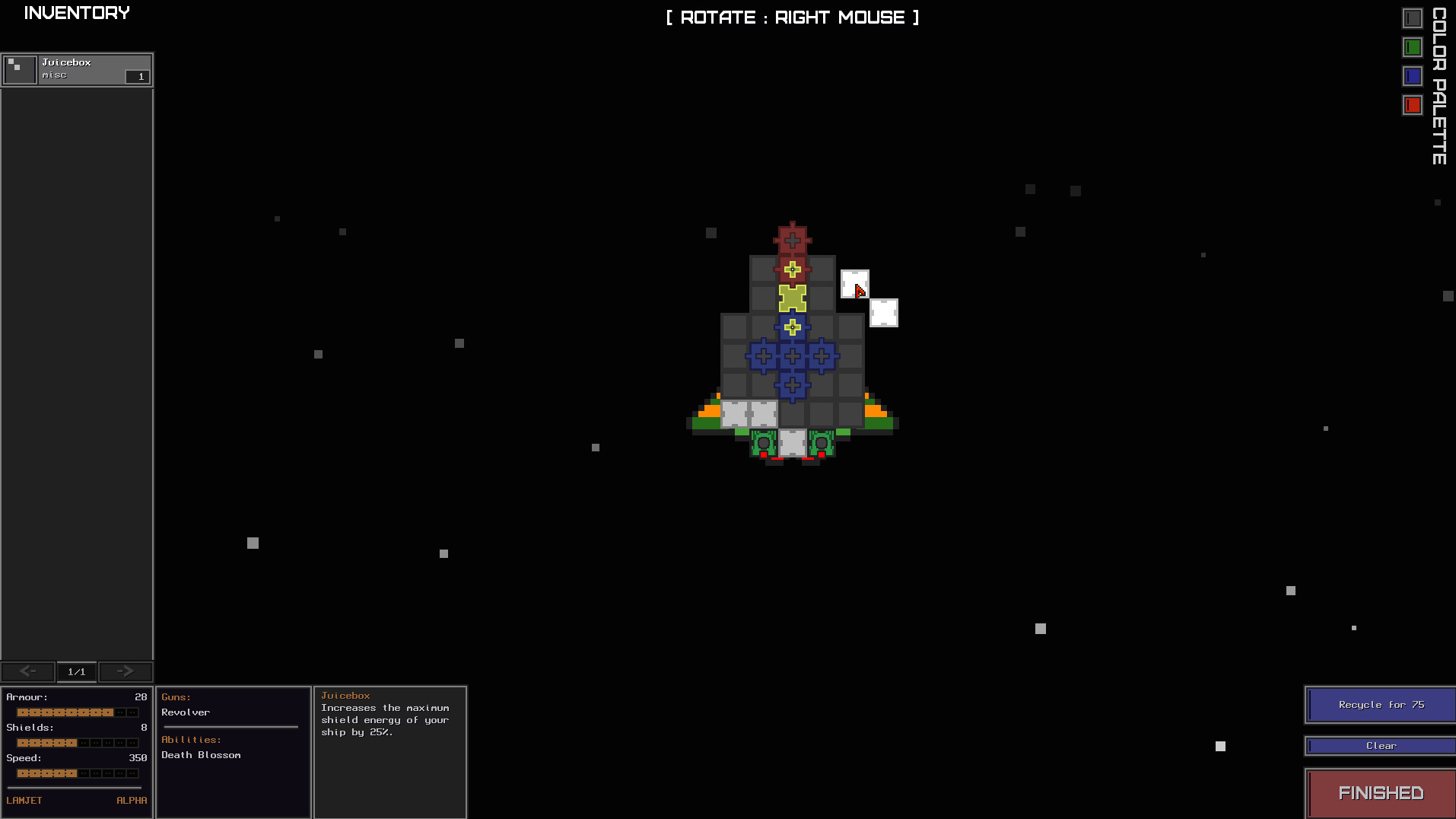
In Starship Rubicon, Earth has been casually destroyed by a mysterious race of space-faring invertebrates. You are a fighter pilot whose cryopod has been collected by a possibly-insane AI, who has placed you in the unenviable position of being humanity’s savior. Shanghaied and alone, you must gather the remaining human survivors and traverse the surprising biodiversity of deep space to find a new home.
{NeoGAF writeup}
Key Features
- Quick Gameplay - Pilot your ship in fast-paced shoot-em-up, featuring a unique approach to arcade physics and controls.
- Customize Your Ship - Upgrade your ship with a Tetris-styled hangar bay as you find weapons and items on your quest.
- Randomized Universe - Make your way through a diverse galaxy as you encounter interesting new lifeforms. Each play session generates a new path of enemies, allies, and items.
- Casual Roguelike - When your ship blows up, that's the end of the line for that game. However, if you collect enough crystal shards by the end of a sector you can save your ship to re-launch it on another level.
- A Fleet Of Ships To Play - Do you prefer fast ships for run and gun? Do you like something that takes a punch but isn't as agile? Start the game with 3 different ships and spend shards to unlock more ships with unique abilities!
- Mod-friendly - Since ships and weapons are exposed in simple external .lua scripts, modding and creating your own content only requires a text editor!
Steam Release Postmortem
I was going to write a standard postmortem -- explain what we tried, show some stats, and pull out some lessons. I'll do some of that later, but I think I'm starting to realize that any specific tips I can share is less important than something else I learned.
Steam traffic is a gigantic morass -- having my game on the front page that first morning felt like timidly standing in the empty floor of the stock exchange moments before it opens. Suddenly, before I can take a breath, the wave of humanity hits. One million (1,000,000) views on the front page, Steam promises. It only took a couple hours. Store page clicks were two orders of magnitude lower than that.
Final sales? Two orders of magnitude lower.
Not gonna lie, I was disappointed. I'd seen the ocean and only felt a drop. I felt that the store page must have failed somehow -- should have used more graphics, should have rewritten the summary again, should have included a demo. The game mechanics were good, but it needed a better hook. It's just another clicky-explody spaceship game; nobody’s going to say, "ooh, tell me more!"
Then Lucy Bellwood linked this wonderful article:
I'm starting to realize what a messed up set of expectations I had. It’s easy to get sucked in and blinded by the numbers above all.
> The #1 lesson to myself is to calm the heck down. Yes, there are a lot of people in the world. Your game is not going to speak to all of them. Concentrate on the people who *do* engage with whatever mess you've hung out to dry. A single enthusiastic fan is worth fifty purchases. If your audience turns out to be small, well, you have to weigh your economic ability to continue versus how much you believe in what you're doing.
> Frantically grasping for reviews, exposure, any way to get the word out! is a dead-end shout into the void. Coverage isn't something to accumulate, the let's players and reviewers who take a look at your game aren't (or shouldn't) just be auxiliary megaphones. I think it's a lot more fascinating to hear where *they* are coming from and why they'd want to spend their limited time on this earth playing a clicky-explody spaceship game.
> I want having an online "presence" to be something that's sustainable. I don't want to feel like an advertisement bot. I was watching robotloveskitty's Twitch the other night and she mentioned that streaming held three attractions:
1) she got to play indie games
2) she got to meet and talk to indie devs
3) it let people know that robotloveskitty is a thing
Tying promotion into things that you enjoy doing anyway seems like the way to go. If anybody has more suggestions or good examples of people doing this, feel free to let me know.
Overall, I’m happy with Starship Rubicon. I made enough to buy all my friends sushi (which was the real goal of this three-year project). We’re sitting on Steam with a tentative 100% thumbs-up. It’s been an experiment in making a game with conservative design (woo spaceships) and great execution (“hey, this is actually pretty fun!”). Maybe the best thing has been to have met people doing the Kickstarter and watch them support me all the way to Steam. I can’t describe how great it feels to have people believe in you like that.
I’ve only just begun to work. Great things are ahead.
(Read the rest of the postmortem here )
(Note: Valve has asked us to not share our exact sales numbers. I feel like that takes a bit of the teeth out of a postmortem, but there are still plenty of lessons to be shared)
STEAM POSTMORTEM
I was going to write a standard postmortem -- explain what we tried, show some stats, and pull out some lessons. I'll do some of that later, but I think I'm starting to realize that any specific tips I can share is less important than something else I learned.
Steam traffic is a gigantic morass -- having my game on the front page that first morning felt like timidly standing in the empty floor of the stock exchange moments before it opens. Suddenly, before I can take a breath, the wave of humanity hits. One million (1,000,000) views on the front page, Steam promises. It only took a couple hours. Store page clicks were two orders of magnitude lower than that.
Final sales? Two orders of magnitude lower.
Not gonna lie, I was disappointed. I'd seen the ocean and only felt a drop. I felt that the store page must have failed somehow -- should have used more graphics, should have rewritten the summary again, should have included a demo. The game mechanics were good, but it needed a better hook. It's just another clicky-explody spaceship game; nobody’s going to say, "ooh, tell me more!"
Then Lucy Bellwood linked this wonderful article:
"As a book editor at Big Five publishers, it never failed to astonish me when enthusiastic tweets to 7-figure "followings" failed to sell a single book. Unlike Soylent Green, Twitter is not made of people."
I'm starting to realize what a messed up set of expectations I had. It’s easy to get sucked in and blinded by the numbers above all.
> The #1 lesson to myself is to calm the heck down. Yes, there are a lot of people in the world. Your game is not going to speak to all of them. Concentrate on the people who *do* engage with whatever mess you've hung out to dry. A single enthusiastic fan is worth fifty purchases. If your audience turns out to be small, well, you have to weigh your economic ability to continue versus how much you believe in what you're doing.
> Frantically grasping for reviews, exposure, any way to get the word out! is a dead-end shout into the void. Coverage isn't something to accumulate, the let's players and reviewers who take a look at your game aren't (or shouldn't) just be auxiliary megaphones. I think it's a lot more fascinating to hear where *they* are coming from and why they'd want to spend their limited time on this earth playing a clicky-explody spaceship game.
> I want having an online "presence" to be something that's sustainable. I don't want to feel like an advertisement bot. I was watching robotloveskitty's Twitch the other night and she mentioned that streaming held three attractions:
1) she got to play indie games
2) she got to meet and talk to indie devs
3) it let people know that robotloveskitty is a thing
Tying promotion into things that you enjoy doing anyway seems like the way to go. If anybody has more suggestions or good examples of people doing this, feel free to let me know.
...
Overall, I’m happy with Starship Rubicon. I made enough to buy all my friends sushi (which was the real goal of this three-year project). We’re sitting on Steam with a tentative 100% thumbs-up. It’s been an experiment in making a game with conservative design (woo spaceships) and great execution (“hey, this is actually pretty fun!”). Maybe the best thing has been to have met people doing the Kickstarter and watch them support me all the way to Steam. I can’t describe how great it feels to have people believe in you like that.
I’ve only just begun to work. Great things are ahead.
*** OK, /EMOTIONAL REVELATIONS. HERE'S THE STEAM REPORT: ***
(probably more relevant to soon-to-be-Steam-devs than the general public, but here goes for anybody who is interested:)(Read the rest of the postmortem here )
[ 2015-07-31 15:37:34 CET ] [Original Post]
Minimum Setup
- OS: Ubuntu 10.04
- Processor: 1.6 GHzMemory: 1 GB RAM
- Memory: 1 GB RAM
- Graphics: OpenGL-supported
- Storage: 35 MB available space
GAMEBILLET
[ 6494 ]
GAMERSGATE
[ 1037 ]
MacGamestore
[ 4146 ]
FANATICAL BUNDLES
HUMBLE BUNDLES
by buying games/dlcs from affiliate links you are supporting tuxDB

